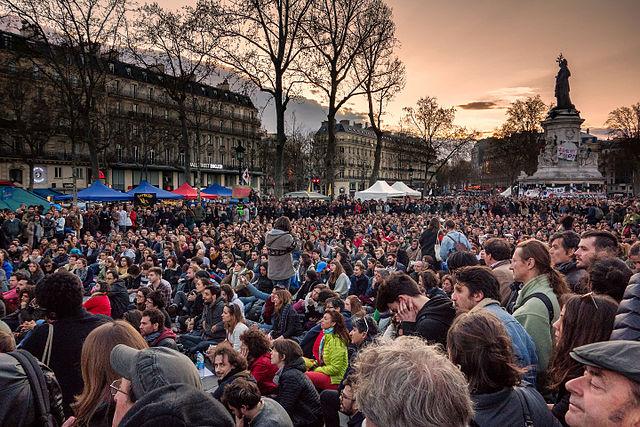
While Brazil attracts attention for the social, political and public-health chaos it faces with only two months to go before the 2016 Summer Olympics, France is also seeing its share of struggles. After several months of tense labor negotiations and job walkouts, massive strikes have swept across the country in response to proposed changes in labor laws.
Conflict between labor unions and the French government accelerated last week when workers at refineries walked off their jobs -- and were soon joined by nuclear power plant employees. Clashes between striking workers and police continued into this week, with rail workers joining the fray yesterday. Air France pilots also say they will soon join the strike.
The conflict has split French society, with a slight plurality of 46 percent polled in a recent survey saying they want the reforms withdrawn. And, as is the case in Brazil, the timing could not be worse as France is set to host Euro 2016, one of the world’s most popular global soccer tournaments, in less than two weeks.
At the core of this dispute is President François Hollande and his administration’s proposal to reform France’s labor laws, which the government says will give businesses more flexibility in negotiating with employees on pay and job benefits. Analysts have long insisted that France’s labor laws, which make it almost impossible to fire workers, have contributed to the country’s persistent unemployment rate — one that more than doubles that of neighboring Germany. The country’s rigid regulations applied to the workplace have long been faulted for France’s almost non-existent labor mobility, which in turn contributes to a youth unemployment rate that stubbornly fluctuates between 20 and 25 percent.
The argument is that by making it extremely difficult to get rid of deadbeat workers and hire younger workers who are hungry and therefore could be more productive on the job, the result has been an economy that has long staggered. The difficulty many young French citizens face in finding gainful employment contributed to the riots over a decade ago in the economically depressed banlieues surrounding Paris. France’s then-Minister of the Interior Nicolas Sarkozy, however, branded the rioters (many of whom were ethnic minorities of Middle Eastern or African descent), as violent “scum” who were part of a “thugocracy.” The riots were eventually quelled, which is in part why Sarkozy was elected France’s 23rd president in 2007 as he was seen a leader who could get things done.
But Sarkozy was judged by many French as unlikeable and indecisive, and he lost his re-election bid to the milquetoast Hollande in 2012. In almost no time, after fumbling on policies and in his personal life, Hollande became deeply unpopular. With another election approaching next year and France’s economic performance still sputtering, Hollande has been forced to backtrack on policies long held sacred by his Socialist party. In addition to nixing his budget plan to hike taxes on businesses and the country’s wealthiest, labor market reform is now on the table.
But France’s powerful labor unions are not having it. Their leaders say the new law will dismantle French workers’ job security without any guarantee that the unemployment rate will fall. The 35-hour work week, which the Hollande administration wants to adjust when businesses face an extraordinary need, has been sacrosanct since it was implemented in 2000, and previous attempts to modify it have failed.
The French have long been dismissed by much of the working world as “having it easy.” But as a BBC analysis infers, the truth is nuanced. Workers who agree to longer workweeks can score even shorter workweeks in return. French workers on average make slightly more money than their German counterparts, but far less than British employees. For those who have jobs, the current workplace protections are seen as rights they have earned. But for the unemployed, especially youth, France’s byzantine labor code is getting in the way of the chance to build for a future, as companies are generally skittish of bringing on more employees if, in the end, they prove to be nearly impossible to fire.
The law will also be a test for French companies, which have long grappled with the perception that they are are not nearly as competitive in North America, Britain, Germany or Asia. France holds its own when it comes to grooming future business leaders, and its largest firms, such as Total in the energy sector, have thrived as they have invested across the globe. Total is also one example of a company that boasts about its employees’ working conditions, which of course are in part possible due to France’s labor code.
If the labor law does change, even in a form vastly different from the one that Hollande proposed, these companies will have a lot on their plate as they seek to convince citizens that they can still be trusted. Like many workers abroad, France’s citizens feel the deck is stacked against them in a world where solid middle-class jobs are becoming increasingly hard to find.
Image credit: Olivier Ortelpa/Wiki Commons

Leon Kaye has written for 3p since 2010 and become executive editor in 2018. His previous work includes writing for the Guardian as well as other online and print publications. In addition, he's worked in sales executive roles within technology and financial research companies, as well as for a public relations firm, for which he consulted with one of the globe’s leading sustainability initiatives. Currently living in Central California, he’s traveled to 70-plus countries and has lived and worked in South Korea, the United Arab Emirates and Uruguay.
Leon’s an alum of Fresno State, the University of Maryland, Baltimore County and the University of Southern California's Marshall Business School. He enjoys traveling abroad as well as exploring California’s Central Coast and the Sierra Nevadas.














